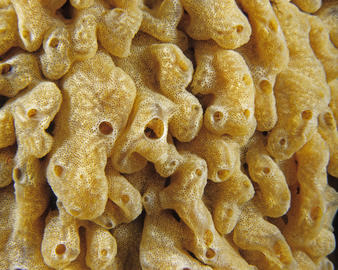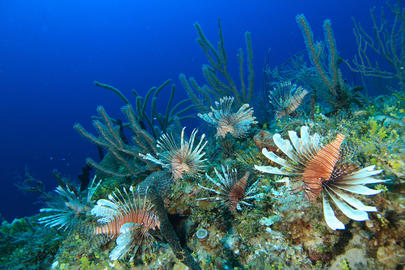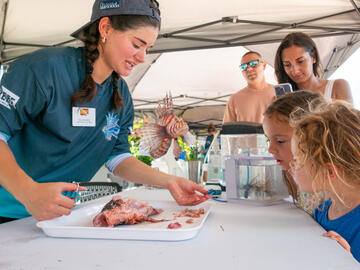Current search
Search found 417 items
- INVASIVE
This article highlights the effectiveness of lionfish derbies in the Florida Keys, including the recent Earth Day Lionfish Derby where winning team Forever Young swept all three prize categories - most lionfish, largest, and smallest.
There is growing concern that lionfish will affect the structure and function of invaded marine ecosystems. Lead author, Stephanie Green, from Simon Fraser University (SFU), along with REEF Director of Special Projects, Lad Akins and other co-authors Aleks Maljković (SFU), and Isabelle Côté (SFU), documented a dramatic 65% decline in 42 species of reef fish eaten by lionfish over a two year period.
Information on fish movement and growth is primarily obtained through the marking and tracking of individuals with external tags, which are usually affixed to anesthetized individuals at the surface. However, the quantity and quality of data obtained by this method is often limited by small sample sizes owing to the time associated with the tagging process, high rates of tagging-related mortality, and displacement of tagged individuals from the initial capture location.
KEY LARGO, FLA. – Reef Environmental Education Foundation (REEF) is excited to announce the 16th Annual Florida Keys Lionfish Derby & Arts Festival, scheduled for April 24-27, 2025. This event uniquely combines invasive lionfish removal with vibrant local arts and conservation efforts, aiming to engage the community in ocean conservation through interactive and educational activities.
Event Schedule
Although we are just one month into the year, our 2019 Field Survey Trips are filling up fast! Because of the great response, we have decided to add two new trips to the 2019 schedule: an invasive lionfish-focused liveaboard trip to Belize this June, and a fish survey liveaboard trip in December, to the Turks and Caicos Islands.
Reef Environmental Education Foundation is excited to announce an opportunity to partner with classroom teachers for the 2023-2024 school year. Thanks to the Coastal Partnership Initiative (CPI) grant from the Florida Department of Environmental Protection, we can offer your class FREE REEF Virtual Field Trips, Colorful Fish Identification Cards for your students, and marine life curriculum for you to use as a classroom resource.





